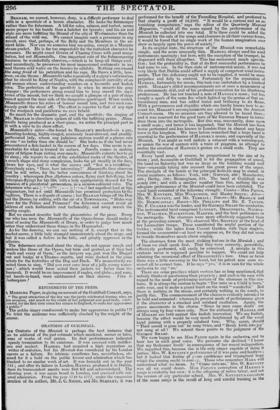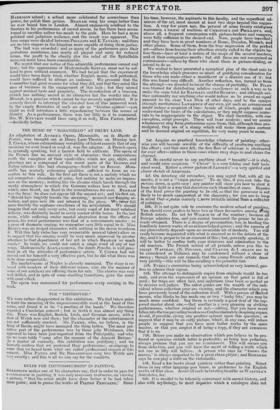ORATORIO AT GUILDHALL.
IFIE Oratorio of the Messiah is perhaps the best instance that an be adduced of the just estimate which mankind, sooner or later, Drms of works of real genius. Its first performances indicated . speedy termination to its existence. It was received with inditterace and neglect. HA.NDEL had acquired a high reputation as writer of oratorios, but his Messiah was considered by his London earers as a failure. Its intrinsic excellence has, nevertheless, obained for it a hold on the public favour and admiration which has Mached to no similar work of art. It was brought out in the year 741; and after its failure in London, HANDEL produced it in Dublin, there its transcendent merits were first felt and acknowledged. The sllowing year, it was again heard in London, and received with uni-ersal admiration. From the year 1749 to 1777, under the successive dreetion of its author, Mr. J. C. SMITE, and Mr. STANLEY, it was performed for the benefit of the Foundling Hospital, and produced to that charity a profit of 10,299/. " It would be a curious and an as tonishing computation," says the editor of the Quarterly Musical Magazine, " could all the sums raised by the performance of the Messiah be collected into one total. If to these could be added the amount for the sale of the songs and choruses in all their various forms, it would be found that no single work of the human imagination ever drew so largely upon the purse of society." In its original state, the structure of the Messiah was remarkably simple, and the score unusually thin. HANDEL always used his wind instruments sparingly ; but here, with the exception of the trumpet, he dispensed with them altogether. This has occasioned much spectdation ; but the probability is, that at its first successful performance he had none to use. In the then state of instrumental music, it was not very likely that Dublin could afford a supply of competent wind instruments. That this deficiency ought not to be supplied, it would be mere prejudice and folly to contend. Fortunately for the reputation of HANDEL, fortunately for music, this task was undertaken by a kindred spirit. MOZART'S added accompaniments are at once a momument of his consummate skill, and of his profound veneration for his illustrious predecessor. He has hot touched a note of HANDEL'S score ; but ha5 caught a spark of the same fire which lighted up the genius of that extraordinary man, and has added lustre and brilliancy to its flame. With a perverseness and stupidity which one hardly knows how to account for, MOZART'S accompaniments are excluded from the Ancient Concert-room. On no occasion are they allowed to be heard there ; and it was reserved for the good taste of Sir GEORGE SMART to introduce them into the metropolis. But this was, necessarily, done upon a small scale ; and hence it has happened, that the Messiah has been worse performed and less known in London than in almost any large town in the kingdom. We have before remarked that a large band is essential to the performance of HANDEL'S music, and especially of the Messiah. You might as well imitate a cataract with a watering-pot, or mimic the war of cannon with a train of popguns, as attempt to realize the creations of HANDEL'S genius on a small scale. They are essentially vast. Every band must, of course, be proportioned to the size of its room ; and, favourable as Guildhall is for the propagation of sound, the band on Saturday last was as large as the building would well bear—especially taking into account the great power of the organ. The strength of the bands at the principal festivals may be stated, in round numbers, as follows : York, 600; Norwich, 400; Manchester, 400.; Derby, 300; Birmingham, 230. The band at Guildhall was „nearly 200; and with a smaller number than this, nothing like an adequate perforniance of the Messiah could have been exhibited. The vocal band consisted of the following strength: Cantos —Miss PAT ON, Mrs. W. KNYVETT, Miss WILKINSON, and Master SMITH; Altos— Mr. W. KNYVETT, and Mr. TERRAIL ; Tenors—Mr. BRAHAM and Mr. HORNCASTLE ; Basses —Mr. PHILLIPS and Mr. E. TAYLOR. Mr. F. CRAMER was the leader, and Sir GEORGE SMART the conductor. The instrumental band comprised LINDLEY, DRAGONETTI, NICHOLSON, WILLMAN, MACKINTOSH, HARPER, and the best performers in the metropolis. The choruses were more effectively supported than at the preceding concert. We observed Mrs. SHEPLEY at the head of her Lancashire troops. These constituted the useful portion of the trebles while the ladies from Covent Garden, with their ringlets, formed the ornamental—at least we suppose so, for they did not seem to trouble themselves much about singing.
The choruses form the most striking feature in the Messiah ; and of them we shall speak first. That they were correctly!, powerfully, effectively performed, will easily be conceived. A mistake in this oratorio never is supposed possible to happen. We could not help admiring the occasional effect of DRAGONETTI'S bow. Once or twice there was a little wavering in the band, but his potent arm soon restored all to correct time. If he says "yes," it is in vain for the whole Orchestra to say "no." There are some practices which custom has so long sanctioned, that nobody thinks of questioning their propriety; and such is the case with regard to the mode of performing certain of the choruses in this oratorio. It is always the custom to begin"For unto us a Child is born," sotto voce, and to make a grand burst on the word "wonderful." But there is nothing in the music, and certainly nothing in the words, to justify this. The commencement of the chorus is evidently intended to be bold and animated: whereas,its present mode of peiformance gives it the character of a checked and subdued exultation. Again, the grave movements in the chorus "Since by man came death" are always sung by four voices only. Now the authority of HANDEL and of MOZART are both against this foolish innovation. We say foolish, because the effect would be very much heightened by all the vocal band joining with a properly subdued tone. Why, again, should "Their sound is gone out" be surer, twice, and "Break forth into joy" not sung at all? We submit these points to the judgment of Sir
GEORGE SMART.
We were happy to see Miss PATON again in the orchestra, and to hear her in such good voice. We presume she declined" I know that my Redeemer liveth" in consequence of her recent indisposition. We regretted this, because she is the only singer capable of doing it justice. Mrs. W. KNYVETT'S performance of it was pure and faultless ; but it lacked that feeling 9f rims confidence and triumphant hope which the singing ought to convey. Those who remember MARA Will understand what we mean. In "Come unto me," Mrs. W. KNYVETT was all we could desire. -111i-.s PATON'S conception of HANDEL'S songs is evidently her own : it is the °Mining of native talent, and not the version of any particular school. Mrs. W. KNYVETT'S execution of the same songs is the result of long and careful training in the HARRISON school ; a • school more celebrated for correctness than Tower, for polish than genius. BRAHAM sung his songs better than we ever heard him in London. Almost exclusively confined to the theatres in his performance of sacred music, he has there been accustomed to sacrifice rather too much to the gods. Here he had a more polished and judicious audience, and the result was apparent. The bass songs were divided between PHILLIPS and E. TAYLOR; and there are no two singers in the kingdom more capable of doing them justice. The hall was crowded ; and as many of the performers gave their gratuitous assistance, and nearly all played and sung for reduced terms, the profit to the charity (for the relief of the Spitalfields weavers) must have been considerable.
We regret that our notice of this admirable performance cannot end here; but the appearance of Mademoiselle SONTAG must not be suffered to pass without comment We had hoped that the experiment would have been fairly tried, whether English music, well performed, would have sufficed to attract an audience. We presume that the Committee had good reasons for what they did, and that they acted like men of business in the engagement of this lady ; but they sinned against musical taste and propriety. The introduction of a bravura, (which has nothing sacred in its character but the words) into the Messiah, is a practice which cannot be too severely reprobrated. It is scarcely decent to interrupt the elevated tone of this immortal work by the empty flourishes of such an air as " Gratias agimus"—you might as well introduce a little rope-dancing between the scenes of liandet. As a performance, there was but little in it to commend. Mrs. W. KNYVETT would have sung it as well; Miss PA.TON, better —decidedly better.



















 Previous page
Previous page